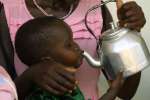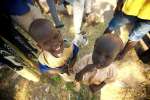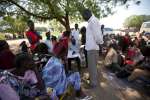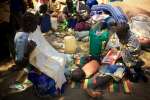Southern Sudanese refugees search for kin in Ethiopian camps
Setting the Agenda, 7 March 2012
SHERKOLE REFUGEE CAMP, Ethiopia, March 5 (UNHCR) – Everyone in this camp seems to be looking for someone. And those who have stopped searching are fighting off tears.
Deng Bullis, 18, is looking for his mother and sister. He was in Kurmuk in Sudan when the bombs fell in September. And when he heard the explosions he ran home and hurriedly collected his most important possessions: an English dictionary, a bible and a biology book.
But while he was able to bring these items across the border to Ethiopia, he has yet to find his family. And so on his forearm he has used a rock to scratch the word "WHERE" on his skin. "I don't know where I will go," he says. "I don't know where my mother and sister are. I don't know where my future is."
In the confusion of conflict, refugees who left Sudan have lost their loved ones. In many respects this has created a sense of longing. Each day, as refugees continue to stream across the border from Sudan into the complex of camps near Asosa, Ethiopian asylum-seekers find themselves seeking word of their relatives. And for some the news is not good.
UNHCR faces myriad challenges associated with the reunification of family members across three different countries, including a war zone. "It is easier to trace people when the refugee population is stable," says UNHCR's Mwajuma Msangi, camp manager for Sherkole.
"But across the border, from the city of Abyei to Blue Nile [state] and in parts of South Sudan, the situation is extremely unstable. It makes it difficult to trace families," he adds. The refugee agency is in the first stages of working with the International Committee for the Red Cross to trace missing family members.
In the meantime, the search for loved ones becomes a matter of informal networks among refugees themselves. New arrivals bring word about others, who in turn provide news as to the status of loved ones. Bullis fears that his father was killed during the bombing in Kurmuk.
Others, however, still hold out hope. Nyankim Bol, 35, who fled from Abyei into Ethiopia in September, hopes that one day she will see her husband. "The bombing started, then soldiers arrived and started shooting," she says. "We were running during the night. I went to find my husband, but we were separated."
Bol, whose family farmed the land before the latest conflict, walked with her five children for about a month before arriving at the Ethiopian border. "I thought only about my children, would they live or would they die?" she says of the journey. "I thought about what I could feed them." Kindly strangers gave them water and okra. Once they arrived safely in Sherkole Camp Bol's longing for her husband, Achuiel Mayol, began to set in.
Now Bol and others who have fled from Abyei sing songs about what happened to them – their way of coping with a terrible past. "We sing this song to remember the people who have died in Abyei," she says.
For still others, the fate of family members is something that is known – and lamented. Nyayu Alcon, 65, knows that her daughter and son-in-law are dead. When soldiers entered Kurmuk, she saw her 32-year-old daughter, Nyayuel, try to escape with her husband, Buth, aged 40. He was a soldier and wanted to fight; she simply wanted to be with her husband. They left the five children with their grandmother. But husband and wife were shot dead.
The older children realize that their parents are dead. But the three-year-old twin boys, Gach and Anabel, don't understand what happened to their parents. "Always they ask, 'When will my mother come?'" says Alcon. "I tell them their mother and father will come soon. Always I tell them that. I don't want them to cry."
By Greg Beals in Sherkole Refugee Camp, Ethiopia






















































